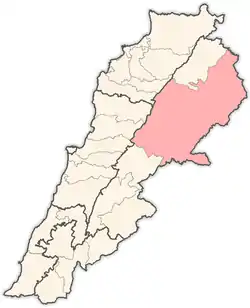Al-Nabi Shayth
Al-Nabi Shayth (Arabic: ٱلنَّبِي شَيْت, romanized: An-Nabī Shayt, also Nabi Chit or Nabi Sheeth (Arabic: ٱلنَّبِي شِيْت, romanized: An-Nabī Shīt), literally "The Prophet Seth"), is a village in the Valley of Beqa'[2] and District of Ba'albek[1] in Lebanon. The village was called by that name because it is considered to contain the burial-site of Seth the son of Adam. A mosque was built on the burial site and it contains the grave of Seth inside the mosque (a rival tradition placed Seth's tomb in the Palestinian village of Bashshit, and likewise in the Iraqi city of Mosul).[3] The village is also the hometown of Abbas al-Musawi, who was a leader of Hezbollah, and an influential Twelver Shi'ite cleric. The village of Al-Nabi Sheeth is predominantly inhabited by people with the surnames Helbawi, Al-Moussawi, Hazimeh and Chokr.
Al-Nabi Shayth
ٱلنَّبِي شَيْت ٱلنَّبِي شِيْت Nabi Chit | |
|---|---|
Village | |
 Mosque of the Prophet Seth in the village of the same name | |
 Al-Nabi Shayth Location in Lebanon  Al-Nabi Shayth Al-Nabi Shayth (Middle East)  Al-Nabi Shayth Al-Nabi Shayth (Asia) | |
| Coordinates: 33°52′20.4″N 36°06′46.1″E | |
| Country | |
| Governorate | Baalbek-Hermel |
| District | Baalbek[1] |
| Elevation | 4,000 ft (1,220 m) |
| Website | nabichit |
History
Ibn Jubayr (1145–1217 CE) noted:
the two graves of Seth and Noah [..] are in the Bika', and two days' journey from Damascus. One who measured the tomb of Shith (Seth), reported to us that it was 40 fathoms (ba') long, and the tomb of Nuh (Noah) was 30. The tomb of Noah's son lies side-by-side with that of Noah. There is a building over the tombs, and an endowment for charitable purposes.
— Ibn Jubayr[2]
In 1838, Eli Smith noted En-Neby Shit as a Metawileh village in the district of Baalbek.[1]
See also
References
- Robinson, E.; Smith, E. (1841). Biblical researches in Palestine, Mount Sinai and Arabia Petraea : a journal of travels in the year 1838. 3 (2nd appendix). Boston, the U.S.A.: Crocker & Brewster. p. 145.
- Le Strange, G. (1890). Palestine Under the Moslems: A Description of Syria and the Holy Land from A.D. 650 to 1500. London: Committee of the Palestine Exploration Fund. p. 422. OCLC 1004386.CS1 maint: ref=harv (link)
- "ISIS destroys Prophet Sheth shrine in Mosul". Al Arabiya News. 2014-07-26.
Bibliography
External links
- Nabi Chit, Localiban


